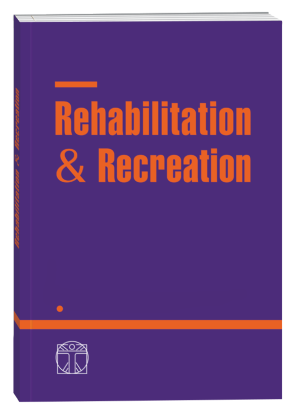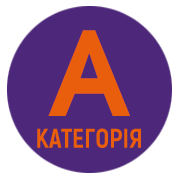STUDY OF THE EFFECTIVENESS OF REHABILITATION INTERVENTION FOR THE CORRECTION OF SYMPTOMS OF ASTENO-VEGETATIVE SYNDROME IN ELDERLY PERSONS WITH THE CONSEQUENCES OF CORONAVIRUS INFECTION
DOI:
https://doi.org/10.32782/2522-1795.2024.18.3.4Keywords:
rehabilitation, post-COVID-19 syndrome, old age, geriatric syndromes, astheno-vegetative syndromeAbstract
Resume. Purpose is to determine the effectiveness of the developed physical therapy program on the dynamics of astheno-vegetative syndrome in the elderly with the consequences of post-COVID-19 syndrome and sarcopenia. Material. 108 elderly people were examined. The control group consisted of 33 people who did not suffer from the coronavirus disease. The main group consisted of 75 people who fell ill with coronavirus pneumonia, diagnosed with post-COVID-19 syndrome and sarcopenia. The main group 1 consisted of 34 people who underwent rehabilitation according to the general principles of the Protocol for providing rehabilitation care to patients with COVID-19. The main group 2 consisted of 41 people who underwent rehabilitation according to the developed rehabilitation program that lasted 3 months. It included therapeutic exercises, functional training, Otago exercise program, massage, ergotherapeutic strategies, nutritional recommendations, therapeutic education. The effectiveness of the program was evaluated by Wayne’s questionnaire, isometric load test, Kerdo index, results of 24-hour heart rate variability monitoring and spectrogram analysis, Fatigue Assessment Scale, Fatigue Severity Scale. The results. Signs of astheno-vegetative syndrome were found in elderly with post-convulsive syndrome and sarcopenia: subjective signs of autonomic dysfunction (according to Wayne’s questionnaire), predominance of the activity of the sympathetic nervous system over the parasympathetic (according to the results of a test with isometric load, calculation of the Kerdo index, analysis of the spectrogram heart rate variability monitoring), asthenia and severe fatigue (according to the Fatigue Assessment Scale, Fatigue Severity Scale). The developed program of physical therapy showed a statistically significantly better effect (p<0.05) on the studied indicators in comparison with the initial parameters and the corresponding data of persons undergoing post-COVID syndrome rehabilitation according to the standard protocol. Conclusions. Elderly patients with post-COVID-19 syndrome and sarcopenia need the development of physical therapy programs taking into account and correcting the manifestations of astheno-vegetative syndrome.
References
Протокол надання реабілітаційної допомоги пацієнтам з коронавірусною хворобою (COVID-19) та реконвалесцентам : Наказ Міністерства охорони здоров’я України від 20.04.2021 № 771. URL: https://www.dec.gov.ua/wp-content/uploads/2021/04/2021_771_covid19_rehabilit.pdf.
Al-Kuraishy H.M., Al-Gareeb A.I., Qusti S., et al. COVID-19-Induced Dysautonomia: A Menace of Sympathetic Storm. ASN Neuro. 2021. № 13. Р. 17590914211057635. https://doi.org/10.1177/17590914211057635.
Carfì A., Bernabei R., Landi F. Gemelli Against COVID-19 Post-Acute Care Study Group. Persistent Symptoms in Patients After Acute COVID-19. JAMA. 2020. № 324(6). Рp. 603–605. doi: 10.1001/jama.2020.12603.
Carod-Artal F.J. Neurological complications of coronavirus and COVID-19. Complicaciones neurológicas por coronavirus y COVID-19. Rev Neurol. 2020. № 70(9). Рp. 311–322. doi: 10.33588/rn.7009.2020179.
Dani M., Dirksen A., Taraborrelli P. et al. Autonomic dysfunction in ‘long COVID’: rationale, physiology and management strategies. Clin Med (Lond). 2021. № 21(1). Рp. e63–e67. https://doi. org/10.7861/clinmed.2020-0896.
Didokha I.V., Aravitska M.G., Yatsiv Ya.M., Hrecheskyi O.V. Effect of a physical therapeutic intervention on locomotive syndrome in the elderly patients with Parkinson’s disease and sarcopenia. Health, sport, rehabilitation. 2023. № 9 (1). Рp. 55–68. doi: https://doi.org/10.34142/HSR.2023.09.01.05.
El Sayed S., Shokry D., Gomaa S.M. Post-COVID-19 fatigue and anhedonia: A crosssectional study and their correlation to postrecovery period. Neuropsychopharmacol Rep. 2021. № 41(1). Рp. 50–55. doi: 10.1002/npr2.12154.
Fernandes L.V., Paiva A.E.G., Silva A.C.B., et al. Prevalence of sarcopenia according to EWGSOP1 and EWGSOP2 in older adults and their associations with unfavorable health outcomes: a systematic review. Aging Clin Exp Res. 2022. № 34(3). Рp. 505–514. doi: 10.1007/s40520-021-01951-7.
Klok F.A., Boon G.J.A.M., Barco S., et al. The Post-COVID-19 Functional Status scale: a tool to measure functional status over time after COVID-19. Eur Respir J. 2020. № 56(1). Р. 2001494. doi: 10.1183/13993003.01494-2020.
Koval N., Aravitska M. Dynamics of kinesiophobia and physical functioning parameters in the elderly adults with sarcopenic obesity under the influence of the physical therapy program. Clinical and Preventive Medicine. 2023. № 4. Рp. 88–95. doi: https://doi.org/10.31612/2616-4868.4(26).2023.13.
Krupp L.B., LaRocca N.G., Muir-Nash J., Steinberg A.D. The fatigue severity scale. Application to patients with multiple sclerosis and systemic lupus erythematosus. Arch Neurol. 1989.
№ 46(10). Рp. 1121–1123. doi: 10.1001/archneur.1989.00520460115022.
Michielsen H.J., De Vries J., Van Heck G.L. Psychometric qualities of a brief self-rated fatigue measure: The Fatigue Assessment Scale. J Psychosom Res. 2003. № 54(4). Рp. 345–352. doi: 10.1016/s0022-3999(02)00392-6.
Nalbandian A., Sehgal K., Gupta A., et al. Post-acute COVID-19 syndrome. Nat Med. 2021. № 27(4). Рp. 601–615. doi: 10.1038/s41591-021-01283-z.
Ortelli P., Ferrazzoli D., Sebastianelli L. et al. Neuropsychological and neurophysiological correlates of fatigue in post-acute patients with neurological manifestations of COVID-19: Insights into a challenging symptom. J Neurol Sci. 2021. № 420. Р. 117271. https://doi.org/10.1016/j.jns.2020.117271.
Yang Y., Wang K., Liu H., et al. The impact of Otago exercise programme on the prevention of falls in older adult: A systematic review. Front Public Health. 2022. № 10. Р. 953593. doi: 10.3389/fpubh.2022.953593.
Downloads
Published
How to Cite
Issue
Section
License
Copyright (c) 2024 A. E. Rakaieva, M. G. Aravitska

This work is licensed under a Creative Commons Attribution-NonCommercial-NoDerivatives 4.0 International License.












